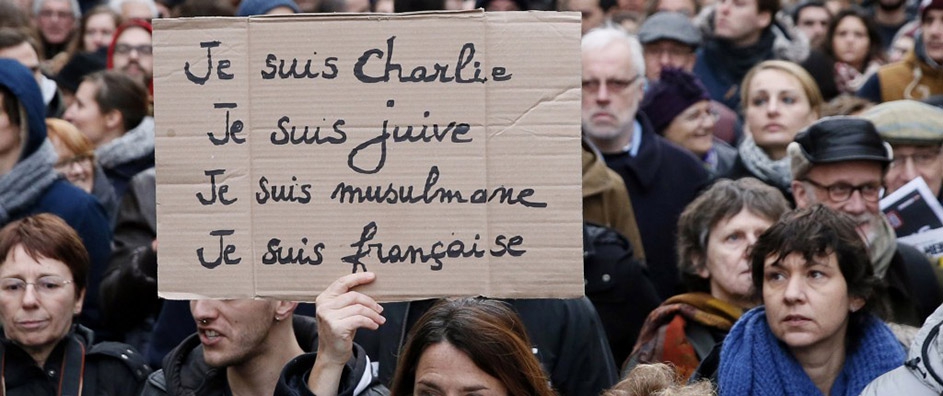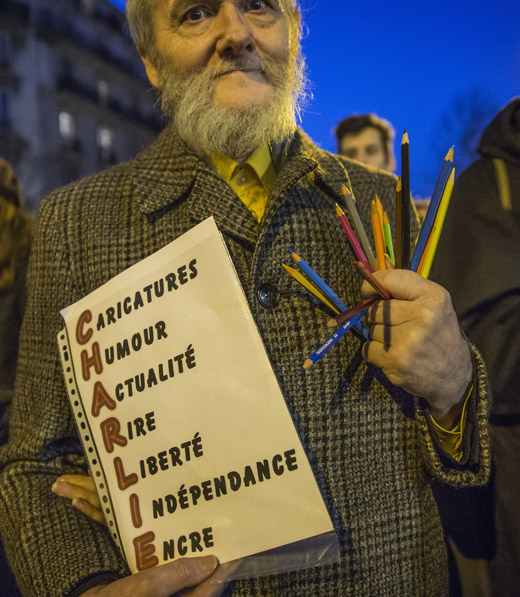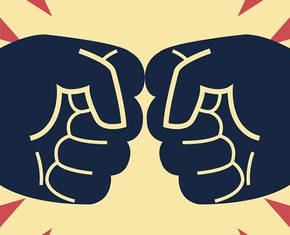The views expressed in our content reflect individual perspectives and do not represent the authoritative views of the Baha'i Faith.
What do you hold sacred?
The terrible assassinations of the French Charlie Hebdo journalists have shown us, once again, that sacredness means something profound—and something very different–to just about everyone. Most people, this latest attack proves, hold certain beliefs, concepts and ideas sacred.
The terrorists—misguided, murderous, deranged and now dead—obviously believed the French cartoonists had challenged and blasphemed their most sacred beliefs by portraying the prophet Muhammad, and by extension all Muslims, in disrespectful and even obscene ways.
The western public—saddened, outraged and defiant–obviously believes, as the massive outpourings of public support amply demonstrate, in the sacredness of free speech, free expression and freedom of the press. They believe the violent deaths of journalists and others blasphemes all freedom.
That collision of sacredness holds us all hostage, making the world a much more dangerous place.
As a journalist and a writer, I personally hold freedom of expression as a sacred value. As a Baha’i, I see the prophets of God as sacred. To me, the Charlie Hebdo cartoons about Muhammad seemed crass, profane, offensive and juvenile—but I didn’t question the rights of the cartoonists to draw them.
Both the eminent French sociologist Émile Durkheim and the pioneering Romanian philosopher and religious historian Mircea Eliade considered the human experience of reality a balance between the sacred and the profane.
Durkheim said: “religion is a unified system of beliefs and practices relative to sacred things…” Eliade said: “The history of religions reaches down and makes contact with that which is essentially human: the relation of man to the sacred.”
Durkheim said the sacred represents the overall interests of the group, with the goal of unity, while the profane represents only mundane individual concerns. Eliade’s interpretation of religious experience also focused on sacred and profane space and time, which he defined by saying “The manifestation of the sacred ontologically founds the world.”
People who consider their Faith sacred—which would include the billions of followers of many of the world’s major religions—obviously object to those who slander and defame their most cherished and deeply-held beliefs. And those who hold sacred the western principles of democracy and free expression believe that assaults on those principles strike at the very foundations of their being and their culture.
Some people call this conflict “the clash of civilizations.” When you think about it, though, that simplistic description doesn’t make sense. The real world has much more variety, variance and nuance than any simplistic east vs. west dichotomy could contain. Many Muslims believe in and fight for freedom of expression; and many westerners, including Christians, Jews and Muslims, take deep offense when others insult their religions.
What can we do to find common ground?
The Baha’i teachings suggest that both of these values—respect for others’ religions and the upholding of the principle of the freedom of expression—can and should peacefully co-exist:
Verily I say unto you, the tongue is for the mention of good; defile it not with unseemly words. Verily God has forgiven the past. Hereafter all must utter that which is seemly. Shun anathema, execration and that whereby man is perturbed. – Baha’u’llah, quoted in Mirza Abul-Fadl’s The Brilliant Proofs, p. 32.
One should not ignore the truth of any matter, rather should one give expression to that which is right and true. – Baha’u’llah, Tablets of Baha’u’llah, p. 38.
Just as in the world of politics there is need for free thought, likewise in the world of religion there should be the right of unrestricted individual belief. Consider what a vast difference exists between modern democracy and the old forms of despotism. Under an autocratic government the opinions of men are not free, and development is stifled, whereas in democracy, because thought and speech are not restricted, the greatest progress is witnessed. It is likewise true in the world of religion. When freedom of conscience, liberty of thought and right of speech prevail — that is to say, when every man according to his own idealization may give expression to his beliefs — development and growth are inevitable. – Abdu’l-Baha, The Promulgation of Universal Peace, p. 197.
For Baha’is, the answer to this conflict of sacred truths means realizing that slandering another’s beliefs only helps spread them—just like killing the messenger makes the message even more widely heard. The Baha’i writings ask all people to abstain from violence and to refrain from criticizing the beliefs of others. When someone does criticize your beliefs, however, the Baha’i teachings recommend ignoring that slander and working to unify humanity:
This is the result of the slanderer’s work: to be the cause of guiding men to a discovery of the truth. We know that all the falsehoods spread about Christ and His apostles and all the books written against Him, only led the people to inquire into His doctrine; then, having seen the beauty and inhaled the fragrance, they walked evermore amidst the roses and the fruits of that celestial garden.
Therefore, I say unto you, spread the Divine Truth with all your might that men’s intelligence may become enlightened; this is the best answer to those who slander. I do not wish to speak of those people nor to say anything ill of them — only to tell you that slander is of no importance! – Abdu’l-Baha, Paris Talks, p. 104.

















Comments
Sign in or create an account
Continue with Googleor